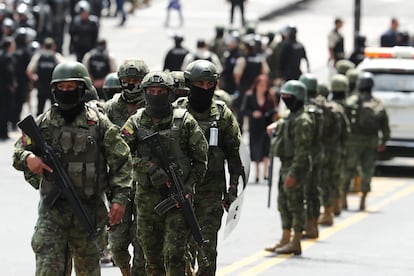A surge of violence in a small town in Ecuador is met with a strategy of war
Manta is the epicenter of drug trafficking organizations that ship globally and the scene of a recent triple crime outside a circus

Violence is becoming unmanageable in Ecuador. The government’s message that they have harnessed the mayhem has been thrown into doubt. President Daniel Noboa and his ministers based the claim on the fact that violent deaths are down by 485 so far in 2024, compared to the same period last year. The problem is that 2023 was the most violent year in the history of the country with an unprecedented homicide rate of 40 per 100,000 inhabitants. And with 2,400 crimes in six months, security remains a priority.

“We are at war, and wars don’t last a day or a week; they are long-term,” warned the country’s Minister of Defense, Gian Carlo Loffredo. Naturally, war implies that those who belong to neither side get caught in the crossfire with no guarantee of safety even behind closed doors. In the last week alone, 127 people have been gunned down, 33 of whom were killed at home. Most of the deaths were registered in the country’s coastal cities. The assassins take advantage of open windows and randomly open fire. This is how a woman and her 13-year-old daughter were murdered on June 2 while having lunch. The gunmen fired without checking who was inside, said a survivor. The crime occurred in Durán, where violent deaths have increased by 1300%. Here, inhabitants were recently shocked by the sight of a 17-year-old lying dead on the sidewalk, shot as he was taking a family member to school.
According to the authorities, the violence has been intense in seven of the country’s 24 provinces. Hence, the signing of a new presidential state of emergency decree in those regions, with no explanation regarding the strategy, beyond increasing the presence of the military and police.
A small city on the Pacific coast that has become the epicenter of violence is Manta, used by criminal gangs to move drugs and money to international destinations. “Criminal behavior seeks to be both adaptable and agile, making their criminal activities and forms of financing viable,” explained Monica Palencia, Minister of the Interior, in a press conference given together with a security bloc consisting of the Police, the Armed Forces and the Ministry of Defense, hours after a triple murder in Manta.
This shooting took place on June 2 outside a circus, where hundreds of people had lined up for tickets to the show. Among them was Cristhian Nieto, an activist working on behalf of addicts and derelicts and the alternate legislator for the incumbent Citizen Revolution party’s assembly woman, Mónica Salazar. Nieto was one of the administrators of the circus that had been in Manta for approximately two weeks. The shooting was filmed by witnesses and images of the consequent chaos and fear were posted on social media. Nieto, his wife, Nicole Burgos, and a 24-year-old man who was standing near them were killed.
The circus shooting triggered the signing of a new presidential decree, this time ordering the security bloc to move to Manta. “We will fight this war and this internal armed conflict from there,” said Daniel Noboa. So far this year, 150 violent crimes have been registered in Manta, 53% more than in 2023. In the decree, the president ordered that the country’s four security institutions temporarily act out of the city.
Ecuadorians have meanwhile agreed to a significant VAT hike to strengthen the military in a bid to curb insecurity.
Sign up for our weekly newsletter to get more English-language news coverage from EL PAÍS USA Edition
Tu suscripción se está usando en otro dispositivo
¿Quieres añadir otro usuario a tu suscripción?
Si continúas leyendo en este dispositivo, no se podrá leer en el otro.
FlechaTu suscripción se está usando en otro dispositivo y solo puedes acceder a EL PAÍS desde un dispositivo a la vez.
Si quieres compartir tu cuenta, cambia tu suscripción a la modalidad Premium, así podrás añadir otro usuario. Cada uno accederá con su propia cuenta de email, lo que os permitirá personalizar vuestra experiencia en EL PAÍS.
¿Tienes una suscripción de empresa? Accede aquí para contratar más cuentas.
En el caso de no saber quién está usando tu cuenta, te recomendamos cambiar tu contraseña aquí.
Si decides continuar compartiendo tu cuenta, este mensaje se mostrará en tu dispositivo y en el de la otra persona que está usando tu cuenta de forma indefinida, afectando a tu experiencia de lectura. Puedes consultar aquí los términos y condiciones de la suscripción digital.








































